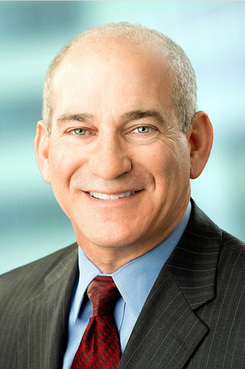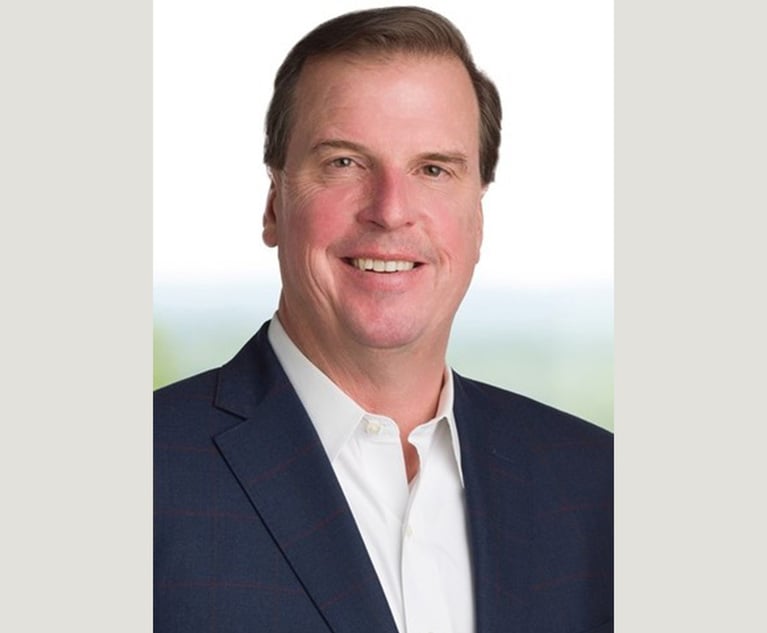Year-End Collections Not Always a 'Crunch' at NJ Law Firms
It's not unusual for law firms to collect a disproportionately large share of their annual revenue in the fourth quarter, with much of that coming in just before year's end, but how hectic the holiday week is, if at all, varies widely, according to New Jersey law firm leaders.
December 13, 2018 at 06:02 PM
5 minute read
 Photo: Raphael Daniaud/iStockphoto.com.
Photo: Raphael Daniaud/iStockphoto.com.
It's not unusual for law firms to collect a disproportionately large share of their annual revenue in the fourth quarter, with much of that coming in just before year's end, but how hectic the holiday week is, if at all, varies widely, according to New Jersey law firm leaders.
Yes, some firm leaders have told tales of an office buzzing with activity around the typically sleepy holiday week.
“New Year's Eve is usually a long day here,” one law firm leader once told the Law Journal.
Alan Zuckerman recently described a similar scene at his own firm.
 Alan Zuckerman/courtesy photo
Alan Zuckerman/courtesy photo“We do take Christmas Day off, but that's about it,” Zuckerman, managing partner of Cherry Hill-based Flaster Greenberg, said in a recent interview. “None of us take vacation between Christmas and New Year's, that's for sure.
“We try to explain to clients—we have good relationships with our clients—that collecting money by the end of the year is important to us,” he said.
Zuckerman said firm and practice leaders meet and endeavor to get bills paid swiftly over the course of the year, and the firm gives clients a 30-day billing cycle.
But December, including the holidays, is a crunch. It begins with a significant meeting early in the month, where “we do sit down … and go over outstanding accounts receivable,” Zuckerman said. The full accounting staff and management team work the holiday week, not only to get money in the door, but to calculate and pay out partner compensation.
The urgency is largely because the firm is a C corporation and so getting receivables in by year's end has tax implications, as well as partner compensation implications; the latter because partners are paid salaries over the course of the year from their draws, and then are paid year-end bonuses based on cash collected, not time billed. No one wants to wait a full year to get paid on a matter, he said.
Zuckerman, like other law firm leaders, pointed out that corporate clients are often similarly motivated by tax considerations to get bills paid by year's end.
Clients call the shots at Parker, Ibrahim & Berg in Somerset, too, and it's precisely for that reason that there's no real year-end push, according to managing partner Sanjay Ibrahim.
 Sanjay Ibrahim/courtesy photo
Sanjay Ibrahim/courtesy photo“I definitely see acceleration in payments,” but “it's not a control issue” for the firm, he said. “In today's world, you don't have much control over that scenario. … It depends on the clients that you have.”
The firm's institutional clients have very defined processes when it comes to getting and paying bills. ”These are big clients who are going to do what they need to do,” he said.
“We're not making extra calls to make the collections” in December, he said. “It's on the client side.”
With wired funds and detailed billing guidelines, “I think this issue is definitely not what it used to be,” Ibrahim added.
James Flynn, managing partner of the Newark office of Epstein Becker & Green and the firm's general counsel, also shrugged off the idea of a year-end collections crunch.
“This year and last year here, we haven't had any major crunches,” Flynn said, noting that efforts to carry out a smooth end of the year begins in October. “Our collections have been more even throughout the year.”
Accounting staff and others will be working during the holiday week, but won't be interacting much with clients, and “I don't think we're going to be sitting around waiting for a particular wire transfer,” Flynn said.
Some New Jersey firms and offices avoid the December crunch by having an offset fiscal year. For Drinker Biddle & Reath, including its two New Jersey offices, the fiscal year ends Jan. 31; and at Sills, Cummis & Gross in Newark, it's a Sept. 30 end date, according to prior Law Journal reports.
Haddonfield-based Archer & Greiner for years has been one of these firms, ending its fiscal year on Sept. 30,
“Anybody who said, let's change that, I would say no,” said managing partner Christopher Gibson.
When December rolls around, “everybody's making that pitch” to clients for a payment, and “I think they get inundated,” Gibson said.
He added that any deal that can be made in December can also be made in September.
And those deals are indeed worked at Archer, and elsewhere, he said.
“Nothing's off the table,” Gibson said. “Everybody's cutting deals. Let's face it, the whole legal profession has become more of a negotiated, let's-make-a-deal concept.”
Some firms, however, say they avoid end-of-year dealmaking.
“We do not offer discounts for clients to pay by year's end,” Zuckerman said. “That seems counterproductive,” because a client could simply hold off on paying, knowing that a discount offer would be coming later, he said.
This content has been archived. It is available through our partners, LexisNexis® and Bloomberg Law.
To view this content, please continue to their sites.
Not a Lexis Subscriber?
Subscribe Now
Not a Bloomberg Law Subscriber?
Subscribe Now
NOT FOR REPRINT
© 2025 ALM Global, LLC, All Rights Reserved. Request academic re-use from www.copyright.com. All other uses, submit a request to [email protected]. For more information visit Asset & Logo Licensing.
You Might Like
View All

Election Law Spending Is on the Rise, but Big Firms Have Reasons Not to Cash In
6 minute read
Troutman Pepper Accused of Inattentive Case Management in $59M Malpractice Suit
7 minute readTrending Stories
- 1Uber Files RICO Suit Against Plaintiff-Side Firms Alleging Fraudulent Injury Claims
- 2The Law Firm Disrupted: Scrutinizing the Elephant More Than the Mouse
- 3Inherent Diminished Value Damages Unavailable to 3rd-Party Claimants, Court Says
- 4Pa. Defense Firm Sued by Client Over Ex-Eagles Player's $43.5M Med Mal Win
- 5Losses Mount at Morris Manning, but Departing Ex-Chair Stays Bullish About His Old Firm's Future
Who Got The Work
J. Brugh Lower of Gibbons has entered an appearance for industrial equipment supplier Devco Corporation in a pending trademark infringement lawsuit. The suit, accusing the defendant of selling knock-off Graco products, was filed Dec. 18 in New Jersey District Court by Rivkin Radler on behalf of Graco Inc. and Graco Minnesota. The case, assigned to U.S. District Judge Zahid N. Quraishi, is 3:24-cv-11294, Graco Inc. et al v. Devco Corporation.
Who Got The Work
Rebecca Maller-Stein and Kent A. Yalowitz of Arnold & Porter Kaye Scholer have entered their appearances for Hanaco Venture Capital and its executives, Lior Prosor and David Frankel, in a pending securities lawsuit. The action, filed on Dec. 24 in New York Southern District Court by Zell, Aron & Co. on behalf of Goldeneye Advisors, accuses the defendants of negligently and fraudulently managing the plaintiff's $1 million investment. The case, assigned to U.S. District Judge Vernon S. Broderick, is 1:24-cv-09918, Goldeneye Advisors, LLC v. Hanaco Venture Capital, Ltd. et al.
Who Got The Work
Attorneys from A&O Shearman has stepped in as defense counsel for Toronto-Dominion Bank and other defendants in a pending securities class action. The suit, filed Dec. 11 in New York Southern District Court by Bleichmar Fonti & Auld, accuses the defendants of concealing the bank's 'pervasive' deficiencies in regards to its compliance with the Bank Secrecy Act and the quality of its anti-money laundering controls. The case, assigned to U.S. District Judge Arun Subramanian, is 1:24-cv-09445, Gonzalez v. The Toronto-Dominion Bank et al.
Who Got The Work
Crown Castle International, a Pennsylvania company providing shared communications infrastructure, has turned to Luke D. Wolf of Gordon Rees Scully Mansukhani to fend off a pending breach-of-contract lawsuit. The court action, filed Nov. 25 in Michigan Eastern District Court by Hooper Hathaway PC on behalf of The Town Residences LLC, accuses Crown Castle of failing to transfer approximately $30,000 in utility payments from T-Mobile in breach of a roof-top lease and assignment agreement. The case, assigned to U.S. District Judge Susan K. Declercq, is 2:24-cv-13131, The Town Residences LLC v. T-Mobile US, Inc. et al.
Who Got The Work
Wilfred P. Coronato and Daniel M. Schwartz of McCarter & English have stepped in as defense counsel to Electrolux Home Products Inc. in a pending product liability lawsuit. The court action, filed Nov. 26 in New York Eastern District Court by Poulos Lopiccolo PC and Nagel Rice LLP on behalf of David Stern, alleges that the defendant's refrigerators’ drawers and shelving repeatedly break and fall apart within months after purchase. The case, assigned to U.S. District Judge Joan M. Azrack, is 2:24-cv-08204, Stern v. Electrolux Home Products, Inc.
Featured Firms
Law Offices of Gary Martin Hays & Associates, P.C.
(470) 294-1674
Law Offices of Mark E. Salomone
(857) 444-6468
Smith & Hassler
(713) 739-1250







